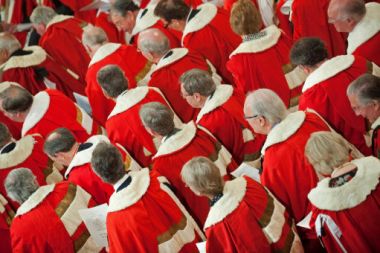House of Lords votes down 'anti-annoyance' law

The House of Lords has dealt a substantial blow to the coalition Government's legislative agenda by voting down a law designed to stop people being "annoying" in public.
The Anti-Social Behaviour, Crime and Policing Bill included provisions intended to replace the unpopular ASBO (Anti-Social Behaviour Order).
The IPNA (Injunction for the Prevention of Nuisance and Annoyance) was claimed by the Home Office to be a more effective replacement on the grounds that it would be easier to acquire, needing less specific evidence.
However, the House of Lords had concerns about the potential broadness of what constitutes nuisance and annoying behaviour.
The draft law would mean that even the capacity to cause nuisance and annoyance could be grounds for issuing an IPNA.
Consequently, the bill was defeated by 306 to 178 votes in the Lords.
Crossbench peer Lord Dear, who led opposition to the plan, pointed out that anyone over the age of 10 could be served with an IPNA, which could last for an indefinite period of time and potentially result in a prison term if breached.
"It risks it being used for those who seek to protest peacefully, noisy children in the street, street preachers, canvassers, carol singers, trick-or-treaters, church bell ringers, clay pigeon shooters, nudists," he said.
"This is a crowded island that we live in and we must exercise a degree surely of tolerance and forbearance."
Conservative Peer Lord Mackay of Clashfern opposed it on the grounds that "one of our fundamental freedoms is the freedom of speech".
"Surely it is clear that in exercising that freedom, one may annoy one or more other people," he said.
Cross Bench Peer Lord Blair of Boughton explained his objections with a story: "I want to take your Lordships back to 1970s Soho where, as a young constable, I was patrolling with a much more streetwise officer.
"We were approached by a rather large Westminster councillor who was objecting to people handing out leaflets about rent rises. He said that he was really annoyed by this. The officer I was with said, 'Well sir, my Aunt Mabel is annoying but I'm not going to let anybody arrest her for just being annoying'."
Campaigners were concerned about the potential threat to freedom of speech. Mike Judge of the Christian Institute said the threshold for evidence was "too low" and the safeguards "too weak".
"[This law] could end up catching legitimate protesters and street evangelists," he said.
The Reform Clause 1 group has been spearheading the campaign against the law with the slogan "feel free to annoy me".
It brings together a diverse range of groups, including the Big Brother Watch, the Christian Institute, the Peter Tatchell Foundation, the Evangelical Alliance, and the National Secular Society.
It has also gained support from Liberal Democrat Life Peer Lord MacDonald of River Glaven, who previously said: "A lone individual standing outside the entrance to a bank holding a sign objecting to its role in the financial crisis, a busker outside a shopping centre, or a street preacher proclaiming the end of days to passers-by may all be capable of causing nuisance and annoyance to some person. The question is whether they should be subject to such broad legislative intervention as is proposed in this Bill."
The bill will now pass back to the House of Commons, where MPs could seek to reinsert the original proposal before it returns to the House of Lords for consideration.











